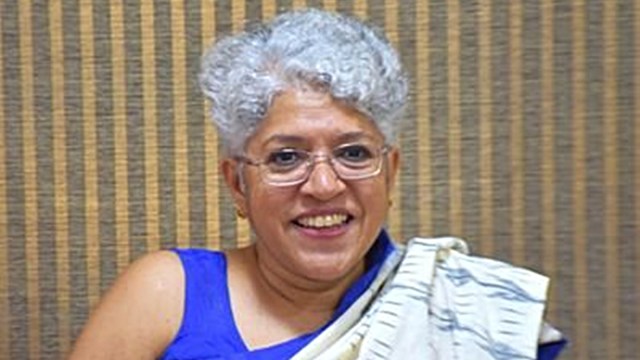Madhura Swaminathan, 62, an acclaimed economist and daughter of the legendary agricultural scientist late MS Swaminathan, Tuesday said at an event in Delhi that the “protesting farmers in Punjab and Haryana cannot be treated as criminals by the government”. Late Dr MS Swaminathan, known as the “Father of Green Revolution” for steering India to food security, was recently honored with country’s highest civilian honor Bharat Ratna by the Indian government.

In an interview with The Indian Express, she talks about ongoing protests by farmers in Punjab and Haryana, their demand for assured Minimum Support Price (MSP), government’s responsibility towards farmers, crises in agriculture and their possible solutions. Excerpts:
Story continues below this ad
How do you see the ongoing protests by farmers in Punjab and Haryana?
Since a substantial part of my father’s career as an agricultural scientist was in Delhi, he was emotionally attached to the farmers of Punjab and Haryana, where he would visit often during the Green Revolution period. He was very concerned for farmers of this region. Every morning he would first read weather news knowing it would affect farmers.
Farmers in Punjab and Haryana are only fighting for better incomes. All they are asking from the government is that “we want better incomes”. This requires new technology, new solutions, and new cropping patterns but also a remunerative price for what they are growing. It’s not that farmers are not ready to change but we have to give them a new package. We cannot ask them to stop growing (say rice) without giving alternatives. Farmers in Punjab and Haryana are more vocal as they have gained from Green Revolution whereas farmers in some other states have not gained anything so their voices are still weak.
The main demand of protesting farmers is legalized assurance on MSP, and implementation of his NCF report. Why do think successive governments have failed to implement it?
Yes, it’s true that though the government has bestowed “Bharat Ratna” on my late father- the man who lived and breathed for farmers- his recommendations on MSP have not been implemented yet, even as it has been seventeen long years that his National Commission on Farmers (NCF) report was submitted.
The union Ministry of Agriculture changed its name and added “Farmers Welfare” to it, which too was one of the recommendations in my father’s report. It was good that they changed the name but that was also the easiest thing to do. But the point is a lot more actually needs to be done for their welfare.
Story continues below this ad
It’s not just the “C2 plus 50 percent formula for MSP” for which his report is still relevant, there are many other lessons in it for the welfare of our farmers. His second report was titled “Serving Farmers, Saving Farming.” In a nutshell, every policy on farming should take farmers along.
My research shows that the government of India has neglected agriculture compared to other countries such as China. Our agricultural expenditure on irrigation, research, extension etc., is very low compared to other countries. We have to spend more on agriculture. On the one hand, we should support basic income of our farmers by giving them assured MSP and on the other hand, we have to spend more on agricultural research and technology to offer them solutions on current crises such as climate change, declining water table, need for diversification among others.
I have been to villages outside Punjab in many other states. In many places, farmers, especially small farmers, have never been visited by extension agents. No one from the Krishi Vigyan Kendras (KVKs) has visited them ever. So, there’s a long way to go.
So what according to you would be the most befitting tribute to your father?
The first step should be implementing assured MSP for 20 major crops and “C2 plus 50%” formula for calculating it. Many economists say that assured MSP will involve too much expenditure and the money can be used for other sectors etc, but this is not a correct framing. We can raise more resources to assure good prices and at the same time, invest in new advancements and technologies. We have to keep investing in the future and increase the country’s agricultural budget. My father’s report even recommended that agricultural workers and farmers should be given assured income. When all government employees can be given pension, then why agricultural workers can’t be given assured income?
Story continues below this ad
From the past some years there has been a sentiment that Green Revolution was responsible for pushing Punjab into the web of wheat-paddy cycle.
Sometimes, people feel that everything we did in the past was wrong but that’s not true. Instead of denigrating the past, we have to find solutions to the new problems.
From the late 1960s, as soon as the Green Revolution had started doubling wheat production, my father had started thinking about ecological sustainability. Declining water table to excessive use of fertilizers, he was worried about everything. That is why he had coined the term “evergreen revolution” which means you have to change your practices with new technology to ensure sustainability.
 Madhura Swaminathan (left) with her father late Dr MS Swaminathan (Photo source: Madhura Swaminathan)
Madhura Swaminathan (left) with her father late Dr MS Swaminathan (Photo source: Madhura Swaminathan)
I want to quote him here. He wrote: “Defend the gains of Green Revolution, extend those gains and make new gains.” We have to “defend our gains” means we have to protect our food security which we gained after much effort. It’s very easy to say that don’t grow rice in India. We can import it from Vietnam or some other country but that’s not the solution. Defending gains doesn’t mean we have to continue with old, redundant practices, we have to progress and adopt new ones. By extending gains, he meant that we have to pay attention to other crops and regions now. We know that more attention was paid to rice and wheat at that time because the country needed it and people had to be pulled out from hunger. Now it is time to pay attention to other crops. We need to grow pulses which we import. There are millets, so extend the gains to all these. The third, making new gains, is the most important. We have to make new gains with research and technology. For instance, there is climate change. We cannot rely on technologies used in the 1960s now. My father always recognized and defended what was gained in the past but at the same time, he acknowledged there were new crops, neglected regions and farmers that needed attention, and new problems which we have to accept as challenges.
As an economist, do you think growing wheat and paddy is the root problem in Punjab?
I am also associated with the Foundation of Agrarian Studies, Bengaluru, which conducted this study last year on costs and profits of ten crops (excluding wheat) over two decades. They studied paddy, maize, toor, gram, urad, groundnut etc. And the finding was: For every crop, the profitability was declining. Several types of input costs are going up but we are not offering any new technology or solutions to our farmers. We are not investing in agriculture as much as we should. If we want farmers to stop certain practices for the sake of environment and climate change, we have to give them alternate solutions.
Story continues below this ad
My father had a career of more than sixty years but till the end, he was reading, thinking and learning something new every day. Those advancements during the Green Revolution saved India from hunger but now we have to look ahead.


 Madhura Swaminathan (left) with her father late Dr MS Swaminathan (Photo source: Madhura Swaminathan)
Madhura Swaminathan (left) with her father late Dr MS Swaminathan (Photo source: Madhura Swaminathan)






